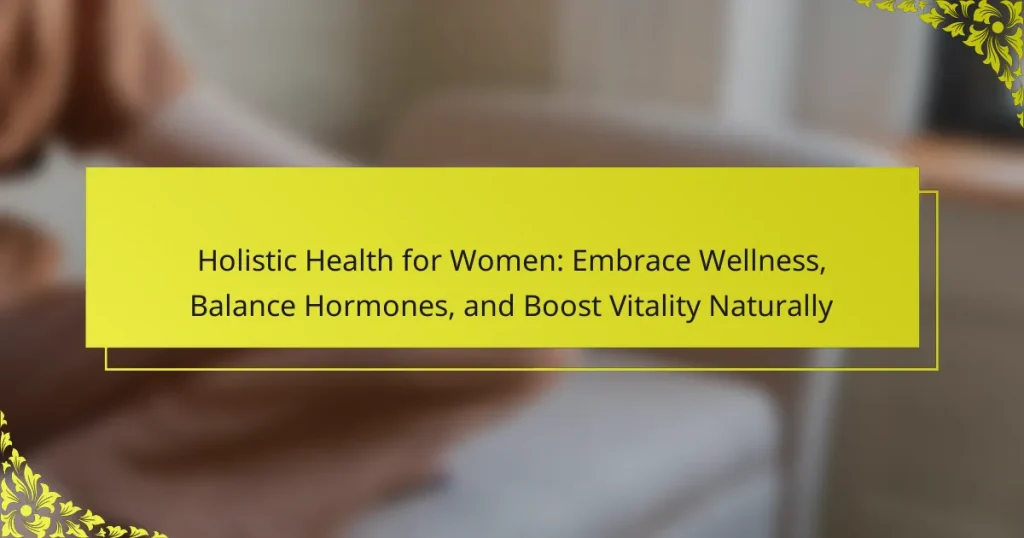Holistic health for women offers a comprehensive approach to enhance wellness, balance hormones, and boost vitality naturally. This article explores the importance of hormonal balance, the role of nutrition and exercise, and effective stress management techniques. It also highlights the benefits of mindfulness practices and personalized wellness strategies to empower women in their health journey. Embracing holistic health can lead to improved quality of life and sustainable well-being.

What is Holistic Health for Women?
Holistic health for women emphasizes a comprehensive approach to wellness, integrating physical, emotional, and spiritual well-being. This method enhances hormone balance, promotes natural vitality, and supports overall health through lifestyle choices, nutrition, and mindfulness practices. Women can benefit from personalized strategies that address unique health challenges, fostering resilience and empowerment. Embracing holistic health leads to improved quality of life and sustainable wellness.
How does holistic health differ from traditional health approaches?
Holistic health focuses on the whole person, integrating physical, emotional, and spiritual well-being, while traditional health often emphasizes the treatment of specific symptoms or diseases. Holistic approaches empower women to embrace wellness, balance hormones, and boost vitality naturally. This method promotes lifestyle changes, such as nutrition and stress management, rather than solely relying on medications. As a result, holistic health fosters a deeper connection between mind and body, leading to long-term wellness. Traditional health may overlook these connections, focusing primarily on physical ailments and quick fixes.
What are the key principles of holistic health?
Holistic health emphasizes the integration of mind, body, and spirit for overall wellness. Key principles include personalized care, prevention over treatment, and the importance of lifestyle factors. These elements foster balance, enhance hormone regulation, and promote natural vitality. Embracing practices such as nutrition, exercise, and mindfulness supports a holistic approach, allowing women to achieve optimal health.

Why is Hormonal Balance Important for Women?
Hormonal balance is crucial for women as it affects overall health, mood, and energy levels. Imbalances can lead to issues like fatigue, weight gain, and emotional disturbances. Maintaining hormonal equilibrium supports reproductive health, enhances vitality, and promotes mental clarity. Regular exercise, a balanced diet, and stress management are essential for achieving this balance. Research indicates that lifestyle changes can significantly improve hormonal health, leading to better quality of life for women.
What are the signs of hormonal imbalance?
Signs of hormonal imbalance include irregular periods, mood swings, fatigue, weight gain, and sleep disturbances. These symptoms can indicate fluctuations in hormones like estrogen and progesterone. Tracking these signs can help identify imbalances and guide holistic health approaches. For instance, maintaining a balanced diet and managing stress can support hormonal health.
How do hormones affect overall health and wellness?
Hormones significantly influence overall health and wellness by regulating bodily functions. They impact mood, metabolism, reproductive health, and energy levels. Balanced hormones contribute to vitality and emotional stability. For women, holistic health approaches, including nutrition and stress management, can enhance hormonal balance, leading to improved well-being. Research indicates that lifestyle changes can effectively address hormonal imbalances, promoting better health outcomes.

What Natural Methods Can Help Balance Hormones?
Natural methods to balance hormones include dietary adjustments, exercise, stress management, and herbal supplements. These approaches promote hormonal equilibrium and enhance overall wellness.
Incorporating a balanced diet rich in whole foods can significantly impact hormone levels. Foods such as leafy greens, healthy fats, and lean proteins provide essential nutrients that support hormonal health. Regular physical activity helps regulate insulin and cortisol levels, contributing to hormonal balance.
Stress management techniques, such as mindfulness and yoga, play a crucial role in maintaining hormone levels. Chronic stress can lead to hormonal imbalances, so incorporating relaxation practices is beneficial.
Certain herbal supplements, like maca root and ashwagandha, have been shown to support hormonal health. These natural remedies may help alleviate symptoms associated with hormonal fluctuations.
How does nutrition influence hormonal health?
Nutrition significantly impacts hormonal health by providing essential nutrients that regulate hormone production and balance. A diet rich in whole foods, healthy fats, and adequate protein supports optimal hormonal function. For example, omega-3 fatty acids found in fish promote hormone synthesis, while fiber-rich foods help maintain stable blood sugar levels, reducing insulin spikes. Additionally, vitamins and minerals, such as vitamin D and magnesium, play critical roles in hormonal regulation. Embracing a holistic approach to nutrition empowers women to enhance their hormonal health and overall well-being naturally.
What foods support hormone balance?
Foods that support hormone balance include healthy fats, leafy greens, and whole grains. These foods provide essential nutrients that help regulate hormonal levels.
Healthy fats, such as avocados and nuts, support hormone production. Leafy greens like spinach and kale are rich in vitamins and minerals that aid in hormone regulation. Whole grains, including quinoa and brown rice, provide fiber, which is crucial for maintaining balanced hormone levels.
Incorporating these foods into your diet can enhance overall wellness and vitality, promoting hormonal harmony naturally.
What role does exercise play in hormonal balance?
Exercise plays a crucial role in hormonal balance by regulating hormone levels and improving overall health. Regular physical activity can enhance insulin sensitivity, reduce cortisol levels, and promote the production of endorphins. These effects contribute to a more stable mood and reduced stress, which are vital for maintaining hormonal equilibrium. Furthermore, strength training and aerobic exercises can specifically influence estrogen and progesterone levels, supporting reproductive health. Engaging in consistent exercise routines also aids in weight management, which is closely linked to hormonal regulation.
What types of exercise are most effective?
Strength training, aerobic exercises, and flexibility workouts are most effective for holistic health in women. Strength training builds muscle and supports hormonal balance. Aerobic exercises enhance cardiovascular health and boost energy levels. Flexibility workouts improve mobility and reduce stress. Incorporating a mix of these types optimizes overall wellness and vitality.
How can stress management techniques help?
Stress management techniques significantly enhance holistic health for women by promoting emotional balance, reducing anxiety, and improving overall well-being. These techniques, such as mindfulness, yoga, and deep breathing, help regulate hormonal fluctuations and boost vitality. For example, practicing mindfulness can lower cortisol levels, leading to improved mood and energy. Additionally, regular yoga sessions increase flexibility and strength while fostering relaxation. As a result, women experience a greater sense of control over their health, contributing to a more vibrant and balanced life. Stress management is a crucial component of a holistic approach to wellness, ensuring women thrive naturally.

What are the Benefits of Embracing Holistic Health?
Embracing holistic health offers numerous benefits for women, including improved wellness, balanced hormones, and enhanced vitality. This approach promotes physical, mental, and emotional well-being, fostering a comprehensive sense of health.
Holistic health practices often include nutrition, exercise, mindfulness, and stress management, which contribute to overall vitality. For example, integrating yoga and meditation can significantly reduce stress and improve hormonal balance.
Additionally, holistic approaches encourage women to understand their unique health needs, enabling personalized wellness plans. This customization can lead to better health outcomes and increased energy levels.
As a result, women who embrace holistic health often experience enhanced quality of life, increased resilience to stress, and a deeper connection to their bodies.
How does holistic health enhance overall well-being?
Holistic health enhances overall well-being by integrating physical, emotional, and spiritual aspects. This approach promotes balance, reduces stress, and improves vitality. Women benefit from personalized practices that address hormonal health through nutrition, mindfulness, and lifestyle changes. Research shows that holistic methods can lead to improved mood and energy levels, fostering a healthier life.
What impact does holistic health have on mental health?
Holistic health positively impacts mental health by promoting emotional balance, reducing stress, and enhancing overall well-being. Integrative practices such as mindfulness, nutrition, and physical activity contribute to lower anxiety levels and improved mood. For example, regular yoga can decrease symptoms of depression and anxiety, fostering a sense of calm. Additionally, holistic approaches often include social support systems, which further enhance mental health by fostering connections and reducing feelings of isolation.

What Unique Practices Support Women’s Holistic Health?
Holistic health for women incorporates unique practices that enhance wellness, balance hormones, and boost vitality. Key practices include mindfulness meditation, which reduces stress and promotes emotional balance; nutritional therapy, focusing on whole foods that support hormonal health; herbal remedies, such as adaptogens that help the body cope with stress; and regular physical activity, which improves overall vitality and mood. These approaches foster a comprehensive sense of well-being, addressing both physical and mental health needs.
How can herbal remedies contribute to wellness?
Herbal remedies can significantly enhance wellness by providing natural solutions for hormonal balance and vitality. These remedies, such as chaste tree and black cohosh, are known for their unique attributes in supporting women’s health. For example, chaste tree regulates menstrual cycles and alleviates PMS symptoms, while black cohosh may reduce menopausal discomfort. Incorporating these herbs into daily routines can lead to improved overall health and increased energy levels. As a result, women may experience a more balanced and vibrant life through the use of herbal remedies.
What are the benefits of yoga and mindfulness?
Yoga and mindfulness offer numerous benefits for holistic health, particularly for women. They enhance emotional balance, reduce stress, and improve overall vitality. Regular practice can lead to better hormone regulation, increased energy levels, and improved mental clarity. Studies indicate that integrating these practices can lower anxiety and depression, fostering a sense of well-being. As a result, women can embrace wellness more fully, enhancing their quality of life naturally.

What Rare Insights Should Women Know About Holistic Health?
Holistic health offers women unique insights that enhance wellness and vitality. Understanding the interplay of mind, body, and spirit is essential for achieving hormonal balance.
One rare insight is the importance of adaptogens, which are natural substances that help the body manage stress. For instance, ashwagandha and rhodiola can significantly improve energy levels and reduce anxiety.
Another critical aspect is the role of nutrition in hormonal health. Foods rich in omega-3 fatty acids, such as flaxseeds and walnuts, support hormonal balance and overall well-being.
Finally, mindfulness practices, like yoga and meditation, can profoundly impact mental health and hormonal regulation. These practices promote relaxation and help women connect with their bodies, fostering a holistic approach to health.
How do environmental factors influence women’s health?
Environmental factors significantly affect women’s health by influencing hormonal balance, mental well-being, and overall vitality. Factors such as air quality, nutrition, and stress levels can lead to unique health challenges for women. For instance, exposure to pollutants can disrupt endocrine functions, leading to hormonal imbalances. Additionally, access to healthy food sources is essential for maintaining optimal health and preventing chronic diseases. As a result, addressing these environmental influences is crucial for promoting holistic wellness in women.
What emerging trends in holistic health should be monitored?
Holistic health for women is increasingly focused on personalized approaches and natural remedies. Key trends include the integration of technology in wellness practices, such as wearable devices for tracking health metrics. Another trend is the rise of plant-based diets, emphasizing the benefits of whole foods for hormonal balance. Mindfulness and stress management techniques are gaining popularity, supporting mental well-being alongside physical health. Additionally, community-based wellness initiatives are fostering support networks for women, enhancing social connections and accountability in health journeys.

How Can Women Boost Vitality Naturally?
Women can boost vitality naturally through holistic health practices. Incorporating a balanced diet rich in whole foods, regular physical activity, and stress management techniques enhances energy levels and hormonal balance.
Essential nutrients like omega-3 fatty acids, vitamins D and B12, and minerals such as magnesium play crucial roles in supporting overall vitality. For example, omega-3s reduce inflammation, while vitamin D is vital for mood regulation.
Engaging in mindfulness practices such as yoga or meditation can significantly improve mental clarity and emotional stability, contributing to increased vitality. Studies show these practices reduce cortisol levels, thereby fostering hormonal balance.
Finally, maintaining a consistent sleep schedule is essential for rejuvenation. Quality sleep enhances recovery processes and supports hormonal health, leading to sustained energy throughout the day.
What lifestyle changes promote increased energy levels?
Incorporating lifestyle changes such as balanced nutrition, regular exercise, adequate sleep, and stress management can significantly increase energy levels. A diet rich in whole foods, including fruits, vegetables, and lean proteins, provides essential nutrients that enhance vitality. Regular physical activity improves circulation and boosts endorphins, promoting a sense of well-being. Prioritizing sleep helps restore energy and supports hormonal balance. Additionally, practicing stress-reducing techniques like mindfulness or yoga can prevent fatigue and enhance overall wellness.
How does sleep hygiene affect vitality?
Sleep hygiene significantly enhances vitality by improving sleep quality and duration. Good sleep hygiene practices, such as maintaining a consistent sleep schedule and creating a restful environment, contribute to better hormonal balance, which is crucial for women’s holistic health. Research shows that women who prioritize sleep hygiene experience increased energy levels and improved mood. By optimizing sleep, women can naturally boost their vitality and overall well-being.
What are the best practices for maintaining vitality?
To maintain vitality, focus on a balanced diet, regular exercise, stress management, and adequate sleep. These practices support overall wellness and hormonal balance.
A nutrient-rich diet includes whole foods, healthy fats, and plenty of fruits and vegetables, providing essential vitamins and minerals. Engaging in physical activity boosts energy levels and improves mood. Mindfulness techniques, such as meditation, help reduce stress, while maintaining a consistent sleep schedule enhances recovery and rejuvenation.
Incorporating these holistic health strategies can significantly enhance vitality and overall quality of life for women.

What Common Mistakes Should Women Avoid in Holistic Health?
Women should avoid common mistakes in holistic health to achieve optimal wellness and balance. Focusing solely on diet without considering mental health can lead to imbalances. Neglecting physical activity undermines vitality; regular movement is essential. Overlooking the importance of sleep can disrupt hormonal balance. Relying on quick fixes instead of sustainable lifestyle changes often results in short-term gains. Finally, ignoring personal intuition in favor of trends may hinder individual progress. Embracing a comprehensive approach is vital for lasting health benefits.
How can misinformation impact health choices?
Misinformation can significantly distort health choices, leading to poor decisions in holistic health practices. Incorrect information about hormone balance and wellness can cause women to adopt ineffective or harmful remedies. For instance, misleading claims about natural supplements may result in neglecting essential medical advice. A study found that 60% of individuals trust online health information, which can perpetuate myths and hinder informed choices. Therefore, verifying sources is crucial for maintaining health and vitality.
What are the pitfalls of neglecting self-care?
Neglecting self-care can lead to significant physical and emotional consequences. Common pitfalls include increased stress, hormonal imbalances, and decreased vitality. This neglect can manifest as fatigue, anxiety, and a weakened immune system. Prioritizing self-care is essential for holistic health, enabling women to maintain balance and enhance overall well-being.
How to effectively integrate holistic practices into daily life?
To effectively integrate holistic practices into daily life, prioritize mindfulness, nutrition, and physical activity. Start each day with meditation or deep breathing exercises to enhance mental clarity. Incorporate whole foods into your diet, focusing on organic fruits, vegetables, and lean proteins to support hormone balance. Engage in regular exercise, such as yoga or walking, to boost vitality and overall well-being. Establish a consistent sleep routine to further enhance your holistic health journey.

What Expert Tips Can Enhance Your Holistic Health Journey?
To enhance your holistic health journey, focus on natural methods to balance hormones and boost vitality. Incorporate practices such as mindfulness, balanced nutrition, and regular physical activity. These strategies promote overall wellness and can lead to improved energy levels and emotional stability. Prioritize self-care routines that align with your individual needs, such as yoga or meditation, to foster a deeper connection with your body. Consider consulting with holistic health professionals for personalized guidance tailored to your unique health journey.
How to create a personalized holistic health plan?
To create a personalized holistic health plan, assess your unique needs, set clear goals, and integrate natural strategies. Begin by evaluating your current health status and identifying areas for improvement, such as hormonal balance and vitality enhancement. Incorporate a balanced diet rich in whole foods, regular physical activity, mindfulness practices, and sufficient sleep to support overall wellness. Regularly review and adjust your plan based on progress and changing needs to maintain effectiveness.
What resources are available for ongoing support?
Holistic health for women offers various resources for ongoing support. These include community wellness programs, online forums, and health coaching services.
1. Community Wellness Programs: Local workshops and support groups focus on holistic practices.
2. Online Forums: Platforms for sharing experiences and advice on hormone balance and vitality.
3. Health Coaching Services: Personalized guidance from certified coaches specializing in women’s health.
4. Educational Resources: Access to articles, webinars, and courses on holistic health topics.
5. Mobile Apps: Tools for tracking wellness, nutrition, and hormonal health.
6. Social Media Groups: Communities for motivation and sharing holistic health tips.




